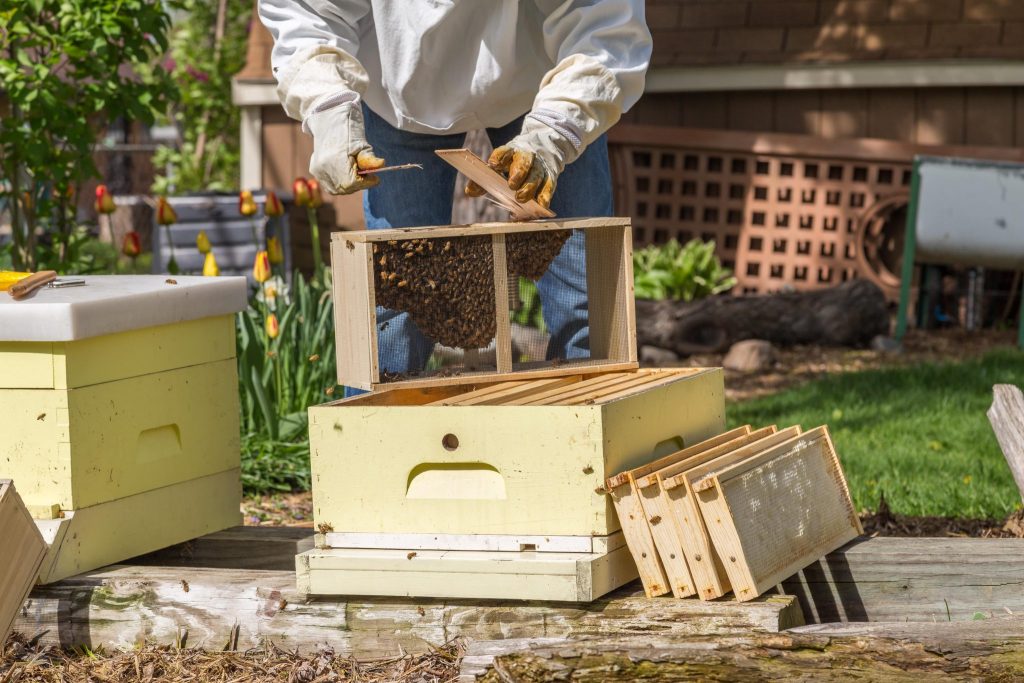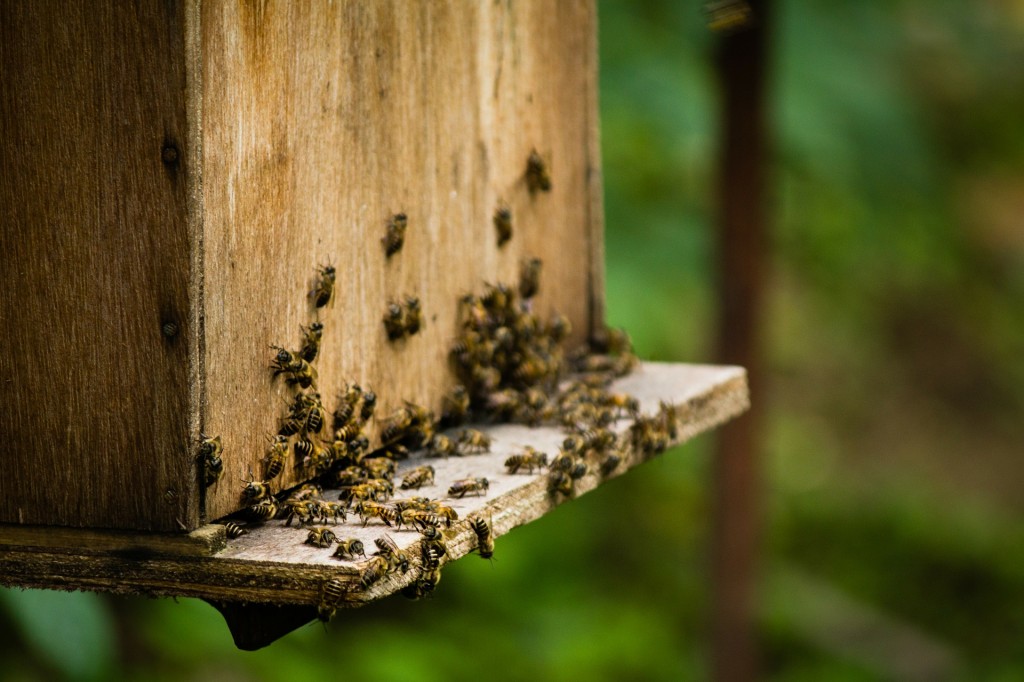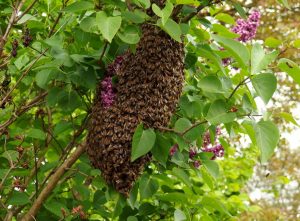If you purchase an independently reviewed item through our site, we earn an affiliate commission. Read our affiliate disclosure.
Throughout the entire world, more and more people are getting into the practice of beekeeping. This is because they have realized the benefits and advantages of homegrown honey. Scientific studies suggest that sweetening food with honey is much healthier than with processed sugar. Natural honey has numerous health benefits. That is why you should consider beekeeping to harvest your own honey, to sell at a profit, or for your own use. You should also know that honey bees are important for the pollination of crops. The importance of bees has led to many cities around the world rethinking their ban on the practice. Once you have decided that you are going into beekeeping, and you have purchased all the necessary equipment, your next question will naturally be, where to buy bees? Buying bees beats trying to catch a swarm and failing at it.
Sources for Buying Honeybees
From your Local Beekeepers’ Association
Different localities where beekeeping is legalized usually have beekeeping associations that deal with bee-related matters. Usually, most beekeeping associations deal with the promotion of beekeeping amongst their members. Additionally, such associations also engage in economic activities like the selling of bees. If there’s a beekeeping association in your area, you can visit their offices to find out if they have honey bees for sale.
Buying bees from your local beekeeper’s association will offer you the following benefits:
- Because such associations deal with matters related to bees, they will teach you about the importance of bees to the environment and also about their economic viability. You will also be informed of local guidelines, regulations and laws that might be in place governing beekeeping in the area. Some of these laws are very important to follow so that you do not get into trouble with the authorities. The laws usually touch on the location of beehives, treatments that can be used in beekeeping and the transfer of bees from one place to another.
- You will also be taught about how to care for the bees, how to feed them, and what to feed them with. The association’s members are a great resource on the best feeds for bees in your locality.
- It will be easy for you to join the beekeepers’ association once you have bought bees through them. The association is a great place to meet other beekeepers and learn about their experiences in beekeeping. You also get the chance to borrow beekeeping books from members of the association.
From Another Beekeeper
People keep bees for a number of reasons. There are those who keep them to help with crop pollination, those who keep them as a hobby, those who keep them to get honey from them, and those who keep them to sell to others. You can opt to buy your first bees from another beekeeper who keeps bees for sale. Buying bees that have been bred in your locality is better than buying those bred overseas. The reason for this is that bees that have been locally bred are usually used to the local environment and will easily adapt. Buying bees which have been bred in a totally different environment from your own may not work well for you in the long run.
When buying bees from another beekeeper, be sure that the colony you buy is free of disease, pests and parasites of honey bees. A quick check for mites and hive beetles and the major bee diseases should be enough. It would be very deleterious and heartbreaking for you to buy a honey bee colony that has any of these problems and then have it fail in your hands. The losses incurred hurt your beekeeping business and can delay your entry into beekeeping if you are a beginner beekeeper.
Buying Package Bees
Package bees are honey bee colonies that come in a box, complete with a queen bee. The package bees can be delivered via various mailing and goods delivery companies and organizations. Package bees are popular in the USA. Many beginner beekeepers have started successful beekeeping operations using package bees. A typical package bee seller puts the bees in a box with screens on the side, and the queen bee in a cage at the top of the package bee on the upper inner surface of the package box. Included in the package box is feed to keep the bees alive during transit.
When you receive your package bees, go about installing them in the prepared beehive as soon as you can. The late afternoon or evening is great. It allows just enough time for all the bees to enter the hive, but not start flying out. They spend the night in the beehive you have installed them in and possibly free the queen bee from her cage. The colony, therefore, accepts the beehive with ease.
It is important to check and ask about the reputation of the seller from whom you are buying package bees. Quick delivery and proper constitution of the package bees are the main factors to consider before settling on the seller from whom you buy package bees. The package bees should be free of mites, hive beetles and honeybee diseases.
A Nuc Hive of Bees
A small nucleus hive is a great way to get a new colony of honey bees. The nucleus hive has a few frames of brood and honey. It comes with a queen bee and several thousand bees. Most honey bee sellers have the option of selling you a nuc hive. Usually, the nucleus hive is bought in spring. The nuc box is placed in a standard beehive box. The bees in the nuc box expand into the beehive box and then the nuc box can be removed later.
Nucleus hives are a great way to start a honey bee colony. Brood included in the nuc box reduces the time taken by the honey bee colony to start having new bees. With other types of honey bee colony propagation, there is a time-lapse between installation and the onset of the queen laying eggs. Nucleus hives have a fast start to reproduction in the honeybee colony.
Honey included in the nuc hive is also an advantage of nuc hives. It serves as the initial food for the bees before they start foraging for nectar and collecting pollen. A third advantage of nuc hives as a means of starting a new honey bee colony, is that it comes with an already cohesive and working colony of honey bees. The bees do not need time to adjust to each other and the queen bee. Frames in the nuc hive are usually already drawn with comb too.
How to Contact Honeybee Sellers

There are many ways to get in touch with sellers of honeybees. When buying from local sellers such as a beekeeper in your area or from a beekeepers’ association, a face-to-face meeting is great. You can also put to use telephone calls to talk to the sellers. You might have to find out who the sellers are via the internet or from local business directory listings. The newspapers too are a great source of information since you might find beekeepers listed in classifieds or advertising in the newspapers. Asking around among your friends and colleagues might also lead you to great beekeepers who will sell you a colony or two of honey bees.
The internet is a resource that you should put to use when looking for someone to sell you honey bees. Initial contact with sellers you find via the Internet should be followed up by a telephone call and a physical visit where possible. Using the internet comes with a higher level of risk than local information sources, but it can also be very rewarding. You should take measures not to be swindled by unscrupulous merchants on the internet who may not deliver honey bees that you have bought, or who may sell you a small colony that will not survive once installed in your apiary.
Factors to Consider When Buying Bees
Choosing a Reputable Bee Seller
Checking the details and credentials of the bee seller before buying bees from them is advisable. Choosing a bee seller who is experienced in handling, packaging and shipping bees will be advantageous to you in the long run. You can get such information about the particular bee seller from reviews about them online and also from their websites. You wouldn’t want to buy bees from suppliers who have negative reviews from customers, either for not fulfilling their guarantee promises or for their poor shipping services.
It is Better to Buy Bees in an Established Colony from a Local Beekeeper
Bees are social insects that live together in one colony and their survival is usually dependent on each other. Buying an already established colony makes sense in that it will be easy for the bees to multiply faster and also survive. It is even better to buy at least two colonies and place them in different hives. This will come in handy for you in the event that one of the colonies becomes weak as it will be easy for you to help boost it with the other.
When buying bees for a starter colony from local beekeepers, ask them if they can sell the bees to you in a nuc hive. Nucleus hives give you better chances of the honey bee colony being successful once installed in your new beehive. If the beekeeper does not have nuc hives, you can buy one and give it to the beekeeper who is selling you bees. They will split their hive and have it settle in the nuc hive and then you can collect the honey bee colony in the nuc box.
Check the Shipment Boxes to Ensure they are Free of Mites
Before placing your newly bought bees right into your beehive, it is advisable that you ascertain that they are free of mites or ants. It is important to note that mites and ants usually feed on honey and larvae of the bees – something that can cause the whole colony to shift to a new location.
Beekeepers with colonies of bees that are under pressure from mites, hive beetles, diseases or other stressing factors for honeybees should not sell bees. For the safety of other beekeepers, it is necessary to only sell honey bee colonies that pose no threat or risk to beekeeping in the locale where they will be sent to. Many areas or regions have laws that govern the importation and movement of honey bees. If an area is free of Varroa mites, it would be very bad if a colony with mites is brought in and causes mite infestations in previously mite-free colonies.
It is advisable to Buy Bees in the Nucleus or Starter Hives
The nucleus of the beehive consists of the worker bees, and the queen and may take up about 4 to 5 frames. This will ensure that the colony is complete with the queen, workers and the drone and once placed in a new hive they will be good to go. Compared to packaged bees, nucs have been found to have a greater chance of survival.
Before Buying Bees
Getting your honey bee colony is a fulfilling step in your beekeeping journey. You should prepare for the purchase so that you are ready for the bees when they arrive. Some of the things you should do are:
Research the different types of bees and settle on the type you want
Honey bees have many different characteristics. The major types of honeybees have variances in temperament, foraging power and resistance to disease, pests and parasites. Some are also notorious for robbing behavior. The bees in your area are the best adapted to local climatic conditions. Find out all you can about the different types of bees and evaluate the information you get against your desired beekeeping products.
Get ready the housing for the honeybees
A beehive of your choice should be ready to receive honey bees before you go about purchasing a colony. The popular types of beehives are the Langstroth and Top Bar hives. There are also other types of beehives that might interest you such as the Warre hive which is very good for wax production. When deciding what type of beehive to go for, consider its ease of use, expandability and wintering capabilities. You might also want to consider the availability of replacement parts and accessories for the beehive.
Have the necessary beekeeping equipment you need
Beekeeping is about the management of honey bee colonies. It involves getting near bees from time to time and carrying out various activities on the honeybees and the beehive. Basic beekeeping equipment should be ready with you before buying honey bees. These include a beekeeping suit for your safety, a hive tool, bee feeders, hive beetle traps and Varroa mite treatments. For the pest and parasite control treatments, it is better to have them and not need them, than need them and not have them readily with you.
Feeding a freshly installed colony of honey bees is often necessary
It is advisable to have some bee feed ready before receiving the honeybees you buy. Sugar and pollen patties are the main feeds given to bees. The sugar is dissolved in water while pollen patties are given as they are. Purchase some stocks of these feeds to last you at least some time until the honeybee colony is strong enough to collect enough food resources for itself. A well-fed honey bee colony settles into the beehive and gets strong faster than one which faces frequent food shortages.
Have a ready location for the beehive you use
The location of the beehive is a major factor in the success of your beekeeping operation. There are many determinants of the final hive location that you should take into consideration. A properly located hive enables high yields of beehive products while keeping the honeybee colony safe. At the same time, the hive location should be such that it is easy to access for the beekeeper but not in a place where honeybees can sting people and animals. Footpaths and other places with a lot of human traffic are not ideal locations for beehives.
Make sure you are compliant with local laws and regulations governing beekeeping
Different states and counties have specific legislation and regulations that you should know before starting beekeeping. It is upon you to know the requirements outlined in these laws and regulations, and make sure that you are not breaking any of them when you start your beekeeping. Compliance with the laws from early on in your beekeeping helps make sure that you will not have your beekeeping operation shut down later when the authorities find out you are not compliant.
Can I Catch Bees Instead of Buying?
You can catch a swarm of bees and install it in a beehive if you do not want to buy bees. Periodically, a honey bee colony splits into two or more swarms. The splits move off and establish new colonies elsewhere. Beekeepers catch these swarms in various ways and use them in their apiaries as regular honey bee colonies. Wild swarms are loved in beekeeping for the genetic variance they bring to your apiary. However, they may add unwanted characteristics to your existing genetic pool of honeybees, such as temperament and predilection towards swarming.
Catching a swarm of bees is doable, though not always easy. Even experienced beekeepers may have a difficult time catching swarming bees. You might set traps to catch swarming bees and catch yourself a swarm quickly, or never catch a swarm at all. This makes catching a swarm unreliable as a method of getting a honey bee colony for your first few beehives. You cannot rely on catching a swarm for the start of your beekeeping operation. The money you spend on a trap box would be better used elsewhere in the young beekeeping operation such as buying equipment.
Experienced beekeepers catching swarms use specially prepared trap boxes. The trap boxes mimic hollows found in trees. They are required to be of a certain minimum volume and size so they are attractive to swarming bees, but not too heavy to handle when they have caught a swarm. Lures to attract scout bees from swarming honey bee colonies are placed in the trap boxes, or smeared on the inside. Sometimes, a beehive box of suitable dimensions that have been used to house bees previously might be used as a trap box. Its smell is believed to attract swarming bees and make them settle into the box with ease.
Conclusion
More people are taking up the activity of beekeeping because they are beginning to understand the great benefits that beekeeping brings. Honey bees help to pollinate crops and also provide people with honey. Once you have decided to get involved in beekeeping and you have already bought all the required equipment, the next thing you will consider is where to buy your bees.
There are two good places that you can buy bees from which are from your local beekeepers association and also from a local beekeeper who sells them. Buying locally bred bees is considered better than buying bees which have been bred abroad. The reason for this is the fact that locally bred bees are usually more easily adapted to the local environment than those bred elsewhere. Before setting up your bee hive in your backyard or wherever place you choose, ensure that your local government approves beekeeping by individuals.
 BeeKeepClub Resources and Guides for Beekeepers
BeeKeepClub Resources and Guides for Beekeepers


This is a great idea especially when you are about to start a bee business this is a big help. On what you said that “you can catch a swarm of bees and install it in a beehive” yes, this is a good idea too. Thank you for the information.
Just a bit of information you omitted. Packaged bees can be shipped to you. If you want a Nuc you will have to drive where ever they are and pick them up.
Very informative. A great guide to starting out as a keeper of bees.
[…] Once armed with the knowledge of raising bees you can then find a place to keep them. Some of the options to consider include rooftop, backyard, garden, farmland, or a local apiary. After the location is determined you can then buy the beekeeping equipment such as the hive, and safety gear such as a bee suit, boots, and gloves. Other requirements include the bee smoker, the hive tool, a bee feeder, and of course the bees. […]